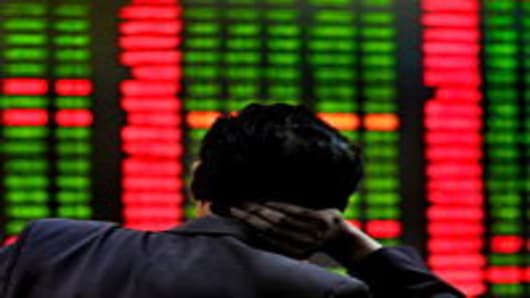China's Shanghai Index, down almost 1 percent, has fallen to a three-year low. No obvious catalyst, but the Chinese economic slowdown is clearly affecting stocks.
What's going to turn the Chinese stock market around?
1) More top-line and bottom-line growth, but it's going in the other direction. According to Citi, top-line growth for China's largest companies — the 143 companies in the China MSCI — in the second quarter of 2012 was 10.7 percent year-over-year, half the growth of a year earlier. Chinese companies have too much capacity and need more financing.
2) A global demand recovery. That, too, is going in the other direction.
The New York Times ran a front-page article noting that Chinese factories were piling up large inventories of unsold goods. The story implied that government officials were hiding the weak data.
It noted, for example, that the agency in charge of releasing data on car registrations has simply stopped releasing the data. The government has not released information on the number of empty apartments since 2008. Problem solved!
3) More stimulus, ah, that always works, but how much stimulus is the Chinese government is really capable of providing? This week, Tianjin and Chongqing each announced investments in local industries (autos, electronics). Large investments, about $240 billion each. The problem, as the Financial Times and others have pointed out, is that there are no details on these plans and they apparently are estimates of how much local officials believe they can attract from outside (read: foreign and private) investors. They're not actually spending the money themselves.
The problem: Local Chinese governments are broke. They have very high debt levels from the massive 2008 stimulus plan. Local governments made money by selling land at ridiculously inflated prices to developers, but the central government has put curbs on ownership of second and third homes in an effort to curb real estate inflation. It's been successful, but now there's far less land to sell. (Read More: China Rescues Tiny Firm, Shows Debt Crisis Building.)
And tax receipts (local governments get some money by taxing smaller companies) are also down.
And what about the national government? Everyone has been waiting for the People's Bank of China to cut rates or the reserve requirement ratio. It will undoubtedly do a bit of both. But cutting rates significantly and loosening the restrictions on real estate investment (that is the big bazooka) will just ignite another round of hot money inflows, just like 2008.
Get the point? The reason there is no rally in China is because the expectations are still very low.
—By CNBC’s Bob Pisani
_____________________________
Bookmark CNBC Data Pages:
_____________________________
Want updates whenever a Trader Talk blog is filed? Follow me on Twitter: twitter.com/BobPisani.
Questions? Comments? tradertalk@cnbc.com



